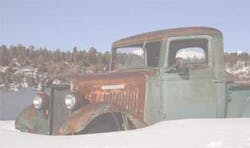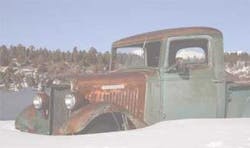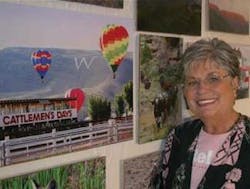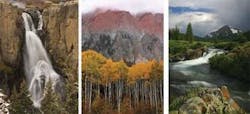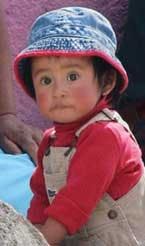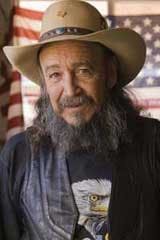The view from the trail
'Independent' hygienist included a private practice in her visual journey
by Cathy Hester Seckman
For someone who never wanted to be a hygienist, Linda Brothers has done pretty well as one. Since she was licensed in 1966, Brothers has worked in general practice; in military clinics; as a traveling temp hygienist; and as the owner of an independent hygiene practice.
“Actually,” she says, “I wanted to be a librarian. But my father, who seemed to be omnipotent, decided hygiene was a good career for a woman. Had I become a librarian I probably would have ended up a recluse, as I was painfully shy and afraid of people — no one can believe that now. Hygiene forced me to engage with people in a way that was both terrifying and growth-demanding.”
She graduated from the Caruth School of Dental Hygiene, Baylor College of Dentistry in Dallas, Texas, then worked in Dallas while her husband served in Vietnam. Later, she worked in an Army-dependent dental clinic at Ft. Hood, Texas. There she worked with other “hygienists” — that is, civilians who were cleaning teeth. One was a part-time hairdresser, she says, and another was a part-time police officer.
After her husband's military service, Brothers worked in Stephenville and Dublin, Texas, where she was the first hygienist in the area. “Many folks were doubtful that ‘some little girl' could clean their teeth like the doctor could. When I introduced myself to one woman at the Dublin office and told her I was going to clean her teeth, she said, ‘Oh, no you're not,' and got up and left the office. The next week I saw her name on the schedule in Stephenville. When I walked in, she apparently decided that I was everywhere, and she let me treat her. She later became a friend.”
When Brothers' children were born, Holly in 1972 and Patrick in 1974, she cut down to two days a week and took up photography. “My father was a good amateur photographer, so I'd grown up in a darkroom. I got an enlarger for Christmas one year, and I started bombarding Texas Parks and Wildlife magazine with my slides. They finally used one on a cover, just to get rid of me, I think.”
One of her bosses convinced her to enter a photo contest for Baylor alumni. “He was ticked off when I placed first and third and he didn't place at all. I later shot a lot of photos for the Baylor alumni magazine. I started teaching photography classes, and eventually left hygiene to open a camera store. It was a total blast, but not much of a money maker.”
When Brothers and her husband divorced, she went back to hygiene, working first in Fort Worth, then in Granbury, Texas. “Eventually I bought an acre in the country and put a house on it, the first home of my very own. I worked at hygiene for 10 years while the kids grew up, and didn't touch photography.”
Today, Holly is a Methodist minister and Patrick is an animal rights activist in Washington, D.C. After her children were grown, Brothers took up horseback riding. She became a trail ride photographer, and did temp hygiene work in Fort Worth in the off-season. “I shot trail riders in Texas, Oklahoma, Arkansas, Wisconsin, and Tennessee for nine years, until I finally burned out. Then I decided to start a mobile temp hygiene practice. I would travel around Texas in my trailer, I thought, and sub for maternity leaves, etc.”
Thinking she could spread out beyond Texas, she posted a resume online and got a call from a dentist in Gunnison, Colo., who needed a hygienist for a year. Getting a Colorado license was easy with reciprocity, so Brothers moved north to Gunnison and spent her first winter in an 80-year-old cabin. “The lowest temperature was minus 38, but I decided that the area was photographic paradise. I finally sold the Texas house and bought one in Gunnison. In 2006, I decided to open my own practice.”
The decision, she says, was “totally wonderful. I rented a small room in a wellness center, bought a portable unit, and was given an old dental chair with one automatic setting. I had a roll-around cart, and a shelf unit with a built-in desk that I bought at a resale store for $90. I went into business as Gentle Touch Dental Hygiene LLC. Since I was the first independent in Gunnison, it took a while for people to understand how it worked, but I was able to stay busy at least two days a week, and my overhead was low.”
Starting the practice, she says, was easy but not simple. “There was no additional hygiene license required. It is possible to practice without a supervising dentist, but you cannot take X-rays or treat perio. The supervising dentist really doesn't have to do anything unless you are taking X-rays, then he is supposed to check them.
“I think that many independents struggle at first, depending on how much money they put into their offices. I purposely kept mine very simple and low key, but many have very traditional offices with the traditional cost and overhead. Most also take quite a while to build up their practices and many continue to work for dentists part-time. There are quite a few very successful independents in Colorado, but there are also many who are just getting by. The primary advantage, I believe, is the satisfaction and the freedom.”
She describes that satisfaction and freedom as a luxury. “What a luxury, to schedule patients for as much time as I wanted, to have time to truly spend on education and helping them become dentally healthy. Every day was an upper. I decorated the office with my photography and made the room comfortable and peaceful. There were no terrifying pictures of periodontal disease or ads for toothpaste. My perio patients had more remarkable recoveries than when I worked in a traditional office. I started recommending Therasol, which my patients actually used and asked for again.”
One patient said Brothers seemed to have more credibility, once she was out on her own.
“My former employer was my supervising dentist. I did not take X-rays, as I had seen other independents having trouble with dentists about that. My relationships with the local dentists was unusually good, which is not always the case.”
While she worked two days a week as an independent hygienist, Brothers also developed her second career. “The photography kept growing. I had a number of gallery shows and sold quite a bit, including cards of local interest. I taught photography courses and digital seminars.”
She didn't forget about her former life as a traveling photographer, though. “One night I had a phone call from Leslie LeFevre, a local hygienist, asking if I would clean her teeth. When I told her I was thinking about selling my practice, she wanted to know when and how much. It was her dream, she said. There was no one else in town I would have felt better about taking over my patients. We have almost identical theories of practice.”
Now Brothers is in the wind again, traveling wherever circumstances take her. She has put her house up for rent, and spent the winter visiting friends and family, taking pictures along the way. She intended to spend February caring for a friend going through breast cancer treatment, then decide on her next move. Wherever life takes her, she'll be happy with it.
“Dental hygiene has enabled me to have freedom in my life to try new things, always with a good career to fall back on. The ability to work part-time when you have children, temp the hours and days you want, or have a fulfilling career — all are possible. Personal growth in relating to others is always an important part of the mix. My belief has always been that we must pay attention to what shows up in our lives and act on it, even if we feel fearful. I do not know what the future holds for me — travel, photography, hygiene, making new friends, and having new adventures will certainly be a part of it.”
